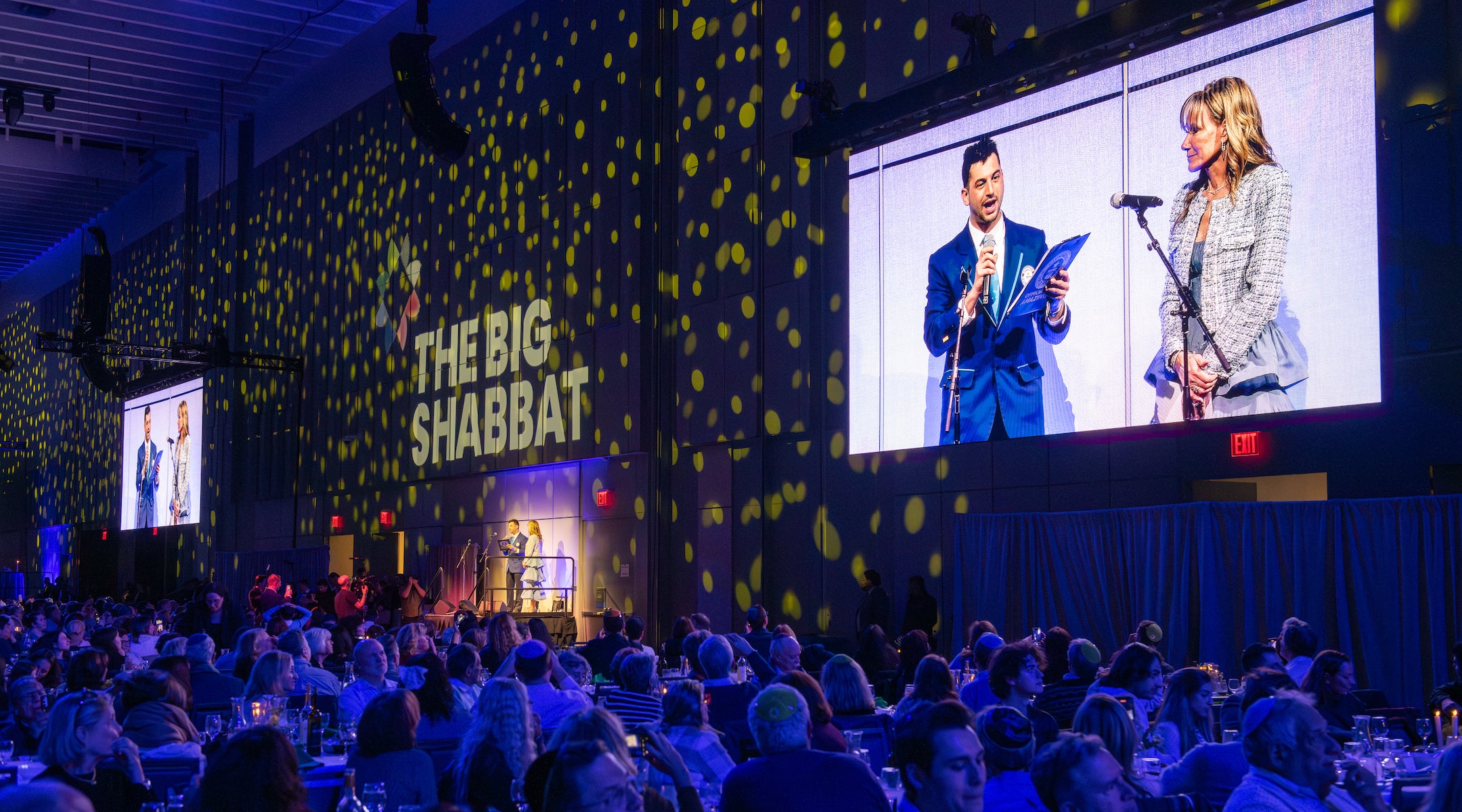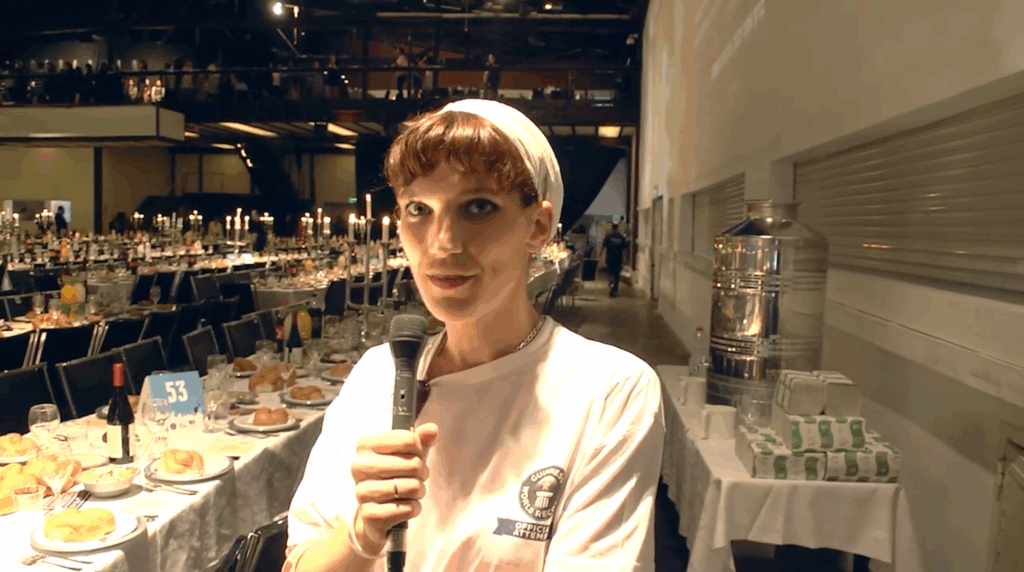Here’s me not feeling even remotely bitter that the Guinness World Record for the largest Shabbat dinner — the one my friends and I set in Tel Aviv in 2014 — has just been broken again.
Absolutely not bitter.
Totally fine over here.
No, truly, I’m not at all dwelling on the fact that this new record-setter organized by Temple Emanu-El’s Streicker Center and held in the New York City’s convention center came with a half-million-dollar check courtesy of the UJA-Federation of New York and a $54 ticket price to boot. Meanwhile, ours — run by a handful of exhausted volunteers at White City Shabbat — was free for anyone who tossed even a single dollar into our crowdfunding campaign. (Side note: Running that campaign remains one of the hardest things I’ve done — begging friends and family for money was totally out of my wheelhouse. Mad props to actual fundraisers everywhere.)
The tables set for a Guinness World Record-breaking Shabbat dinner, hosted by White City Shabbat in Tel Aviv, June 13, 2014. (Gideon Markowicz/Flash 90)
We bootstrapped everything. Zeev Isaac, owner of Hangar 11, Israel’s largest venue, gave us his space at cost. I personally folded napkins for what felt like 30 years. Golan Wineries, with whom we had a long-standing relationship from hosting our monthly 200-person Shabbat meals, catering mostly to Anglo immigrants to Israel, sponsored the wine. And even then we still couldn’t make the budget work, so Chabad swooped in at the 11th hour to plug the hole.
Apart from a pre-Shabbat musical Kabbalat Shabbat concert, we didn’t have a budget for entertainment during the meal. Unlike with Temple Emanu-El, there was no spare cash for trapeze-artist-cum-violinists playing “Fiddler On The Roof” hit “Tradition” while dangling from the rafters. Our entire event, on the other hand, stayed firmly gravity-compliant. We figured no one would notice as long as any excess funds went toward copious quantities of hard alcohol. I was newly pregnant, so I spent much of the night pretending to take shots by stealthily launching them over my shoulder, while everyone else got progressively louder singing Shabbat songs. One very drunk husband — tasked with distributing said shots — stumbled the entire hour-long walk back to Jaffa.
But the real difference wasn’t the finances, at least from what I can see from afar. It was in the overarching vibe.
For one, our dinner fully adhered to Orthodox customs. The meal we served was a traditional Shabbat spread — including meat — while Temple Emanu-El dared to go pescatarian, a dramatic departure from the de rigueur Shabbat table. Had my Moroccan grandmother been there (and alive), she’d have lobbed one of her famous spiced meat boulettes at one of the 68 chefs catering the event.
Look, the New York menu spotlighted Adeena Sussman — the undisputed Shabbat queen of cuisine — as well as three other exciting Jewish chefs, so who am I to grouse?
But in crafting our menu, we were adhering to Guinness’ rules. Guinness told us explicitly that we needed table captains to enforce traditional Shabbat practices: Kiddush, the blessing over the wine; Hamotzi, the blessing over bread; proper prayers and nothing that would violate religious law.

The moment The Big Shabbat broke the record for world’s largest Shabbat dinner, held at the Javits Center on Nov. 21, 2025. (Rob Buchwald)
The menu had to be faxed in advance (2014, yet somehow still the halcyon fax era) to an overseer who then decided whether it qualified as “traditional Shabbat fare.” We were explicitly told, for example, that lasagna — served in New York — was out.
And the fish rule. Oh, the fish rule. Guinness insisted that every single person had to receive a piece of fish within the first five minutes of the meal — even if they hated fish, were allergic to fish, or planned to treat it as an art installation. Fish was the required first course, and thus fish must appear on more than 3,000 plates in five minutes. Hundreds of waiters stood in position with steaming salmon. The Hamotzi blessing was made and they sprinted. It was absurd and glorious. The room erupted into cheers as waiters tore around the venue, flinging fish trays with military precision.
New York’s celebrants faced their own salmon. But they had other advantages as they set their record.
In Tel Aviv, Shabbat means no public transport, so most of our guests had to be within walking distance, or for non-observant attendees, drive or catch taxis. (The Berlin Shabbat dinner that broke our record a year later was a breeze in that respect — everyone was already at the venue for the Maccabi games.) Temple Emanu-El’s crowd, in contrast, was filmed at subway stations arriving at the event at the Javits Center.
Temple Emanu-El also had Andrew Glass, a Jew from Brooklyn, on hand as their Guinness adjudicator (or, in his words, “aJewdicator”). We, on the other hand, had to fly in Pravin Patel from London. Nice man, but distinctly not Jewish, so he could write down attendance. Unfortunately, that meant relying on his rudimentary counting method, which I still blame for our official tally of 2,226 — even though we handed out upwards of 3,000 bracelets.
Speaking of bracelets: Guinness required each attendee to wear a unique numbered band so they could be counted. Simple on a weekday. On Shabbat? I spent months searching for budget-friendly pre-numbered bracelets that couldn’t be torn off after the event. I eventually found a supplier in China. I distinctly remember the hormonal meltdown — I was pregnant after all — when it looked like they wouldn’t arrive in time. They did — just. No wristbands plagued the New York event.
We also faced a challenge when it came to the crucial Guinness requirement of keeping people in their seats for the required hour-long duration. Adhering to Orthodox interpretations of Jewish law meant no live music once it was sundown. We had to rely on the spirit of the Shabbat, not Broadway stars, to captivate attendees. And after it was over, we had little in the way of documentary evidence — we stopped videotaping when Shabbat began. There’s no tape of the moment we were declared the winner.
But the thing about an event complying with Orthodox practices is that it naturally opens the door to everyone. Our guest list ran from former chief rabbi Yisrael Lau to haredi TV presenter Sivan Rahav-Meir and her family, to more traditional types, like American-Israeli basketball player Tal Brody, attorney Alan Dershowitz, former officials Michael Oren and Irwin Cotler, to the proudly secular Tel Aviv mayor Ron Huldai. And, since the date we chose happily coincided with Pride, a whole additional cohort in glitter joined us fresh off the parade.
At a time when divides between religious and secular Jews are once again threatening to tear Israeli society apart, looking back on the 2014 record-breaking Shabbat dinner, with its mingling of black hat-wearing haredi Jews and secular Tel Avivians in strappy dresses, is something of a balm.
So, no, I’m really not bitter about being usurped.
On a serious note, the generous corner of my soul really is glad last week’s dinner happened. We always said we set the record just so others could break it. Temple Emanu-El did that with flair, from the snappy slogan (“Breaking bread. Breaking the world record”), to the high-caliber lineup, to creating an atmosphere that, by all accounts I’ve seen online, was genuinely magical (even among those who found the aerial act … puzzling). The organizers also deserve credit for the top-notch security, something that can’t be taken lightly in this climate. And there was released hostage Omri Miran leading the Shabbat candle-lighting with his wife Lishay — a small act that seemed seismic. Communal moments carry a new kind of weight now, and it seems everyone in that room felt that.
So yes, I’m genuinely happy they broke the record.
And no, I’m not bitter.
Well. Maybe just a smidgen.
Mostly because no one thought to invite me.
Power the news that matters to you. Before 2025 ends, help (JR)’s independent, award-winning newsroom document Jewish history in real-time.
The views and opinions expressed in this article are those of the author and do not necessarily reflect the views of (JR) or its parent company, 70 Faces Media.




